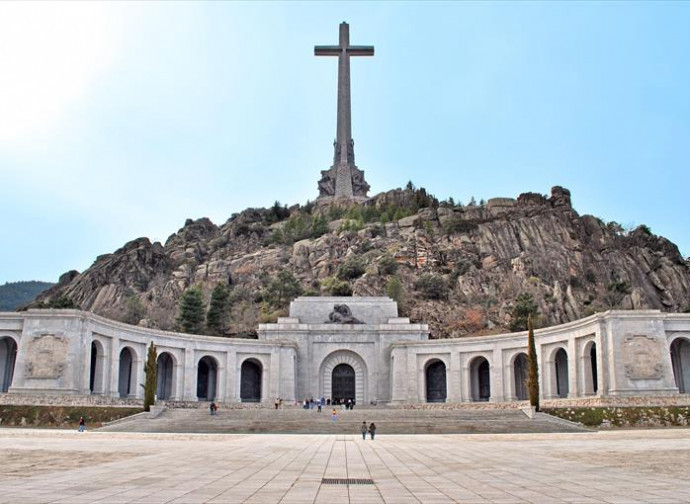The Spanish government declares war on Crosses
The new law on Democratic Memory also targets the tallest cross in the world, located in Valle de los Caidos, from which Francisco Franco's body was also moved three years ago. The Benedictine monks will also have to leave, to turn the place into a democratic symbol. But this is only part of a war on all crosses in Spain. Protests from the bishops.

In Spain the war on crosses, accused of 'Francoism', is relentless. Numerous crosses scattered around the country are all found guilty of having been erected at the behest of Francisco Franco, and therefore inevitably bearers of apologia for the regime. Starting with the enormous one (150 metres high) in the Valle de los Caidos (Valley of the Fallen), located in the Cuelgamuros valley. The complex, located 60 km from Madrid, and wanted by Franco, also includes a Benedictine abbey and contains the remains of the fallen (from both sides) of the Spanish Civil War.
"Resignificacion" is the keyword of the Ley de Memoria Democratica, which completes the previous Ley de Memoria Historica (2007) of the government of José Luis Rodríguez Zapatero, already known for the secularist thrust imparted so decisively during his term of office that a special neologism was coined to indicate his action: "zapaterismo". The 'Democratic Memory' Law, approved on 14 July by the Congress of Deputies and then forwarded to the Senate, envisages its transformation and renaming, implementing the intentions of the current socialist premier Pedro Sanchez.
Among the new provisions, Article 54 envisages, among other things, changing “the name of the ‘Valle de los Caídos’, which will be called ‘Valle de Cuelgamuros’” and will be “a place of democratic memory whose resignification (resignificacion) [...] aims to strengthen constitutional and democratic values”. And the Fundacion de la Santa Cruz, which the Ley declares “incompatible” with constitutional values, is declared extinct. Even the Benedictines are preparing to pack their bags: their very presence would be a remnant of 'nacionalcatolicismo'.
But Franco, dead and buried, was already evicted in 2019, his remains transferred from the Valle to the Mingorrubio-El Pardo cemetery, following a bill passed the previous year, just two months after Sanchez took office. Evidently 'de-Francoing' is not enough because the objective is something else, as announced for years. With Franco gone, what remains to be eliminated? That cumbersome cross and the numerous 'incriminated' crosses in the various Spanish provinces.
The war on crosses has been going on for years, even before the new Ley: the removal of the cross of Callosa de Segura, withdrawn from the public square as an embarrassing object, amid protests from hundreds of people, dates back to 2018. In 2021 it was the turn of as many as 34 crosses in the province of Cáceres carefully listed by the Committee of Experts of Historical Memory, among the Francoist symbols to be removed. These days in Castellón they bid farewell to the Cruz del Ribalta, also accused of Francoism, which last April was vandalised with the colours of the Republican flag. On 2 August, the bishop's curia described the removal of the cross as 'totally improper'.
Article 35 of the law promoted by Sanchez does not spare symbols "contrary to democratic memory" that are located in private or religious buildings but "projected onto public space", while the previous Ley 'zapatera' was milder, including "artistic-religious" reasons among the grounds for avoiding removal. Now, however, the owners will have to take them down or remove them, unless the operation affects the stability of the building. "Crosses are not history, but propaganda", thunders Miguel Ángel del Arco Blanco, professor of contemporary history at the University of Granada, "and removing them does not threaten history, but purifies and puts an end to a vision of the past that cannot be honoured in the present".
"The aim is to humiliate the Catholic Church", says Hazteoir, who appeals to the bishops to stand up in defence of the cross and the Benedictine community. The Spanish bishops' conference in 2020 had expressed reservations about the desire to turn the Valley into a civil cemetery, since religious cemeteries "welcome everyone, believers and non-believers alike", also expressing concern about the "desire to write a kind of official history that would become an educational guideline". And recalling above all that the cross in itself is “a sign of reconciliation”.
But Sanchez's party seems to have a real obsession. "Are you serious about wanting to destroy the highest cross in the world just to give yourself a sectarian satisfaction?" asked Santiago Abascal, leader of Vox, during the debate. There is little that is serious, including the alternative proposal of the other left-wing party, Podemos – reported by Hispanidad – not to destroy the cross, but merely amputate its arms to turn it into an obelisk. Madness, according to the technicians, since total removal is easier than amputation. But it appears that any madness is acceptable to avoid seeing “esa horrible cruz”, as the vice-president of the government, Carmen Calvo, called it.
But why is a cross so frightening - whatever the circumstances of its construction - while thousands of kilometres away Lenin sleeps blissfully and publicly without anyone thinking that the daily visits to his corpse (the corpse of a dictator!) should be mistaken for apologia for anything? And should we tear down churches and palaces built during the twenty-year fascist period and which, although devoid of fasces, display the unmistakable style of the regime? To erase monuments is to erase a significant source for studying history, even in its most controversial periods. Sanchez's purifying zeal seems rather similar to that which, in these very weeks, has driven the Nicaraguan government to imprison or detain in their homes bishops and religious. One suspects that for the Spanish premier 'resignificacion' rhymes with 'desacralizacion'.
